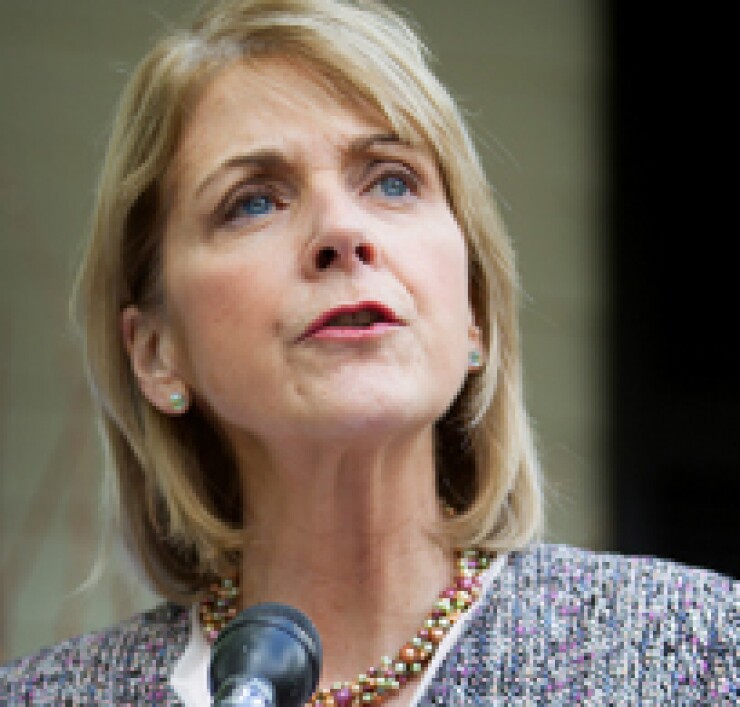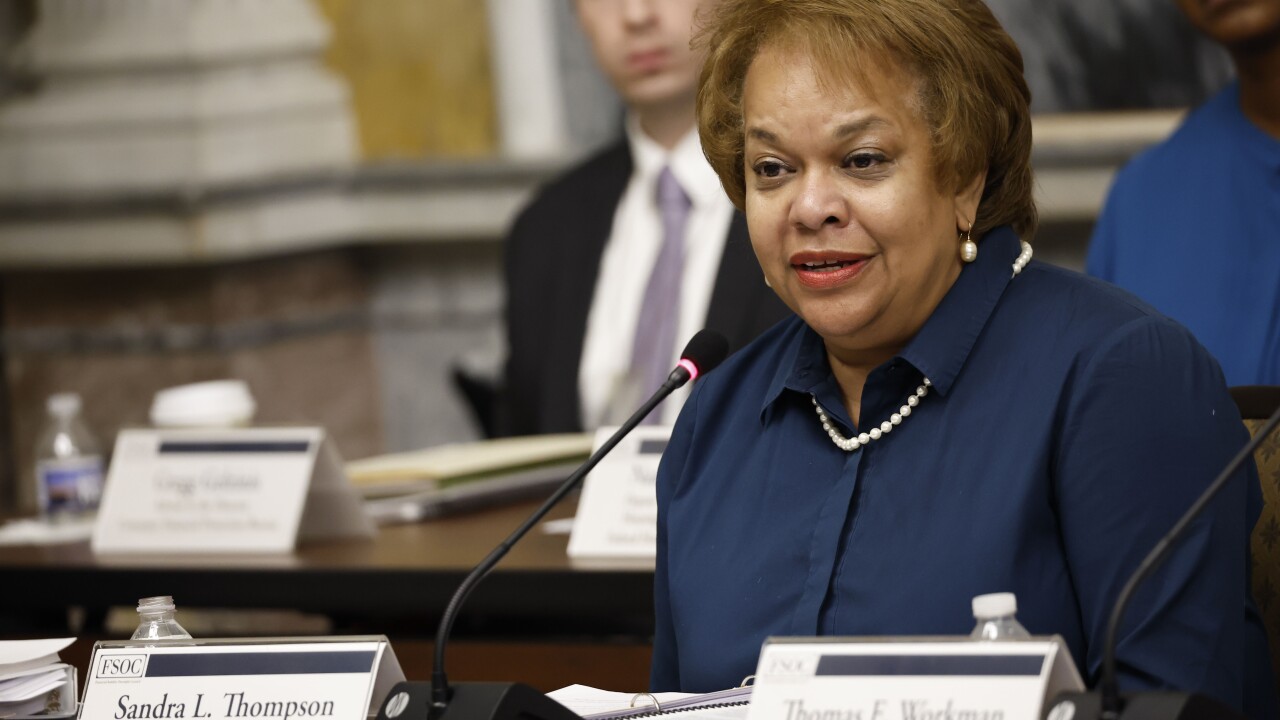
A Boston nonprofit with ties to Massachusetts Attorney General Martha Coakley sits at the center of her
Coakley repeatedly mentions the nonprofit, Boston Community Capital—which charges distressed borrowers rates near 7% to rework their mortgages—in her
Fannie and Freddie won't comply with a state law intended to help nonprofits such as Boston Community Capital buy foreclosed homes and resell them to the homeowners who defaulted, Coakley alleges. The law says a mortgage creditor may not refuse to sell a home to a nonprofit simply because that nonprofit intends to sell the property back to the borrower.
The suit raises fresh questions about well-meaning but potentially flawed attempts to aid distressed borrowers. It also highlights the broad question of whether taxpayers should foot the bill for some (but not all) borrowers, even as the government-sponsored enterprises operate in government conservatorship with
Boston Community Capital buys foreclosed homes at market prices. Its affiliated mortgage company, Aura Mortgage Advisors, then originates a new 30-year mortgage to the original borrower at a rate of roughly 6.75% (at a time when the average rate is in the low 4% range). To participate, the homeowner has to prove a financial hardship and agree to share any appreciation with Aura when the home is ultimately sold or refinanced.
Fannie and Freddie have balked at the group's proposition, out of concern that it could encourage borrowers who would otherwise keep paying their mortgages to default.
"They say these are not arm's length transactions, and we don't dispute that," says Elyse Cherry, the CEO of Boston Community Capital. "But the state statute explicitly says if a nonprofit is engaged in this [activity], they must allow it. This is a case where ideology is trumping good financial practices."
Some mortgage experts question why Coakley would try to force the GSEs to cater to a boutique nonprofit that charges high interest rates and pays steady dividends to a cadre of investors and foundations.
"It's a bit like predatory lending, since they're charging borrowers a higher interest rate than the existing market rate, and they have a shared appreciation mortgage, so it's not an affordability model," says Bruce Marks, the CEO of the Neighborhood Assistance Corp. of America, another housing nonprofit based in Boston.
Cherry says the nonprofit has to charge above-market rates in order to cover dividends to its backers and also build a cushion for losses.
Coakley declined to comment for this article. Fannie, Freddie and the FHFA also declined to comment, citing pending litigation.
Cherry, who founded Boston Community Capital in 1984, is not a typical consumer advocate.
A former partner at the law firm now known as Wilmer Hale, she earned $571,190 last year from Boston Community Capital and its various affiliates, according to public tax forms. The nonprofit operates venture funds, a national tax credit program, an alternative energy program and Aura Mortgage.
Cherry has known Coakley for years and is co-chair of the finance committee for the attorney general's bid to get elected governor this fall.
"The AG's office has been focused on foreclosure issues since the housing crisis," Cherry says. "They've known our work forever."
She adds in an email: "I have been proud to support Martha for a long time because I have great respect for the work Martha has done as attorney general on the foreclosure crisis."
Boston Community Capital's Stabilizing Urban Neighborhoods Initiative has originated loans to just 353 borrowers in the past few years, Cherry says. It had to foreclose on two of those homeowners; Cherry says the organization's default rate is 4.2%, slightly below the national average of 4.5% calculated by CoreLogic. The group asks that borrowers make a $5,000 down payment on the new mortgage so they have some equity from the get-go.
Because the borrowers are high-risk, the nonprofit marks up the purchase price of the homes by 25% on average in setting the mortgage amount, to build in a cushion in the event of a default. Boston Community Capital screens borrowers for their ability to repay the loan, Cherry says.
The business model relies on banks and mortgage servicers to let properties go at a discount to the amount owed on the mortgage.
"BCC is asking the lenders to take a hit, ultimately," says Jon Skarin, a senior vice president at the Massachusetts Bankers Association. "They're a mortgage lender and they are not run like your average nonprofit. This is not a charity, it's a loan program and ultimately the loans have to be repaid. To their credit, they are upfront about what they do and they've generally been successful."
Since the housing crisis intensified in 2008, Boston Community has raised enough from several foundations and high net-worth individuals to complete $50 million in mortgages, Cherry says.
The group's loan fund pays an annual return of 4.25% to several foundations, including the Calvert Foundation and the Kresge Foundation, among others, she says.
The nonprofit held $5.8 million in loan loss reserves against $106 million in loans, a ratio of 5.5%, far more than most banks. (Federal Deposit Insurance Corp. data shows that the loan loss allowance to loans for all banks was 1.67% at the end of the first quarter.)
Last year, the nonprofit got a $35 million line of credit from East Boston Savings Bank, a unit of Meridian Interstate Bancorp. The loan is backed by the group's portfolio of mortgages.
"We had to get comfortable with the fact that the funds were used for depressed loans, but they were for good, responsible borrowers that got into loans that should never have been made to begin with," says Jeff Dickinson, a senior vice president at East Boston Savings Bank. "We got comfortable with how they underwrote the loans and weeded through the applicants to pick good borrowers in bad situations."
Cherry says she had a deal with Fannie to help distressed borrowers but that changed in 2012 when the state passed the foreclosure law cited in Coakley's suit. The law requires that banks and servicers show proof of their standing to foreclose, and that creditors (including Fannie and Freddie) evaluate borrowers for loan modifications before initiating a foreclosure.
The law also says nonprofits can purchase distressed homes at their current fair market value, even if they are sold or rented back to the original homeowner, as long as the homeowner is qualified financially.
Fannie and Freddie have policies that require sales of distressed properties to be arm's-length transactions. The reason is to discourage borrowers from defaulting en masse to get cheaper mortgages, the "moral hazard" issue that banks have also raised as a reason why they would not offer principal reductions. The FHFA also has a "make whole" policy that prevents Fannie and Freddie from accepting anything less than the outstanding loan amount from a former homeowner.
The GSEs will pay more trying to evict and foreclose on these borrowers, most of whom owe more on their mortgages than their homes are worth, Cherry says. Home prices are not rising in low-income neighborhoods because wages are stagnant, she argues.
In Massachusetts, foreclosures hit an 18-month high in May, rising 58% from a year earlier, according to data firm RealtyTrac. Scheduled public auctions of foreclosed homes jumped to a 15-month high, up 178% in May from a year earlier. In Boston, foreclosures jumped 44% in May from a year earlier.
"What we're saying is, 'sell us the home at the same price that you would sell to anybody else, and yes, it goes back to the original homeowner, because the mortgage amount doesn't make any sense,'" Cherry says. "There’s this idea that if you help one homeowner all the others are going to stop paying their mortgages. But one of the reasons the recovery is so anemic is they are still dealing with a huge overhang of people who can't afford their mortgage."
Related:







